U.S. and Kaddafi, then and now
In this entry are collected images and text showing the friendly relations between high-level American officials and Kaddafi over the last three years.
On September 5, 2008, Secretary of State Condoleezza Rice met Kaddafi at his residence in Tripoli. Here she walks toward him, as he holds his hand to his heart as a gesture of respect.
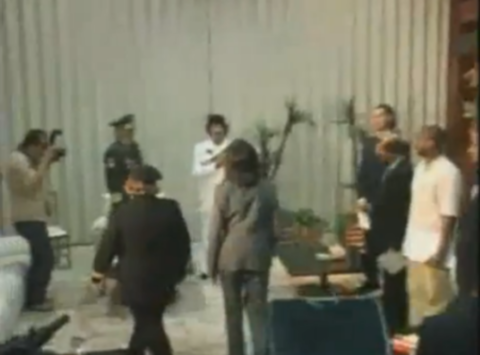
By the way, notice the sway of her hips that her masculine suit cannot suppress. This reminds us that Kaddafi had an innocent if idiosyncratic “crush” on Rice and kept an album of her pictures which he showed to reporters.
Here Kaddafi gestures Rice to take a seat:
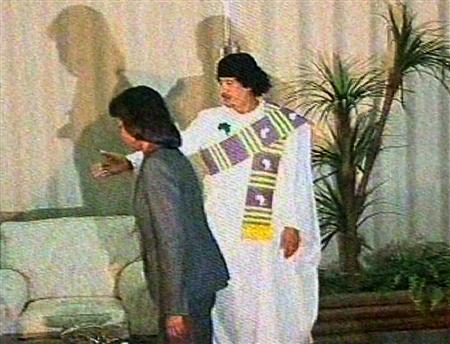
After meeting with Kaddafi, Rice held a news conference where she
said:
“I think we are off to a good start. It is only a start but after many, many years, I think it is a very good thing that the United States and Libya are establishing a way forward…. This demonstrates that the U.S. doesn’t have permanent enemies.
“It demonstrates that when countries are prepared to make strategic changes in direction, the United States is prepared to respond. Quite frankly I never thought I would be visiting Libya and so it is quite something.”
Here is the YouTube of the meeting. At 45 seconds, Rice speaks of America’s positive relationship with Kaddafi, and of putting the past behind us.
Here, in July 2009, a smiling President Obama shakes hands with Kaddafi before dinner at the G-8 meeting in Europe. It was the first time a U.S. president had met Kaddafi after his 40 years in power.
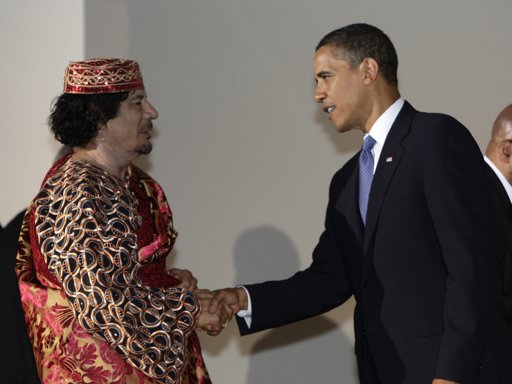
U.S. President Barack Obama before a dinner at the G8
summit in L’Aquila, Italy on Thursday, July 9, 2009.
A month later, on August 15, 2009, Sens. McCain, Lieberman, Graham, and Collins visited Kaddafi in Tripoli. It was at this meeting where McCain spoke of the desirability of moving forward with the bilateral relationship between Libya and the U.S.
Here is McCain shaking hands and politely bowing to the Libyan leader:
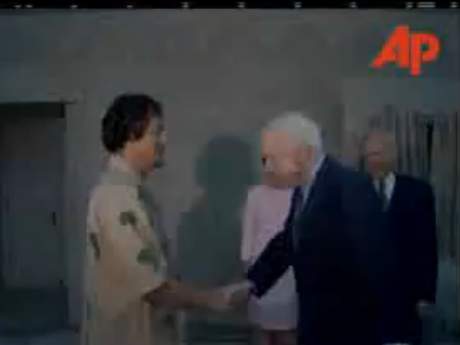
Here Kaddafi is standing with the four U.S. senators, one of them a former presidential nominee, another a former vice presidential nominee:
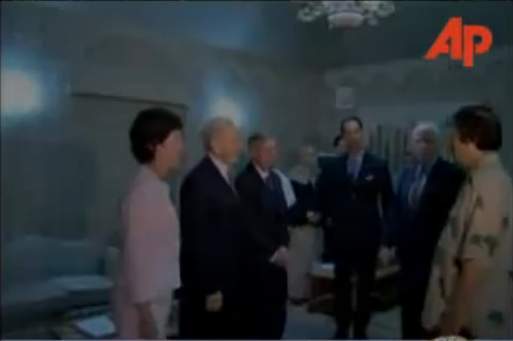
Here is McCain’s enthusiastic Twitter message sent out after the meeting:
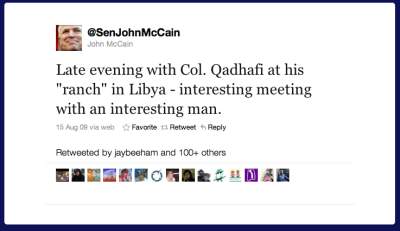
But here is what McCain, Lieberman, and Graham were saying about Kaddafi in March and April 2011, as reported in an April 2, 2011 VFR
entry where I quoted Andrew McCarthy:
Kaddafi’s leading U.S. enemies today were his pals yesterday
The three senators most vociferous for the destruction of Kaddafi are McCain, Lieberman, and Graham. Guess where those three august individuals were in August 2009? They were meeting with Kaddafi in his compound in Tripoli, praising his regime, promising him more U.S. military aid, and going along with the pending release of the Lockerbie bomber.
Andrew McCarthy has the unbelievable tale, this morning at NRO:
The Senators Sway: Before they wanted to kill Qaddafi, they were celebrating in his tent.
John McCain, Joseph Lieberman, and Lindsey Graham are the Senate’s most energetic proponents of sinking the nation ever deeper into the Libyan morass. In a joint interview on Fox last weekend, Senators McCain (R., Ariz.) and Lieberman (I., Conn.) were breathless in their rendering of the “freedom fighters” and the “Arab Spring” of spontaneous “democracy.” Friday they upped the ante with a Wall Street Journal op-ed, rehearsing yet again what an incorrigible thug Qaddafi is and how “we cannot allow [him] to consolidate his grip” on parts of Libya that he still controls.
For his part, Senator Graham (R., S.C.) told CNN Wednesday that he would like President Obama to designate Qaddafi an “unlawful enemy combatant” with an eye toward legitimizing the strongman’s assassination. He and Wolf Blitzer discussed whether the hit could be pulled off by the covert intelligence operatives President Obama has inserted in Libya. The next day, in his plaintive questioning of Defense Secretary Robert Gates at a Senate hearing, Senator Graham wondered why American air power could not just “drop a bomb on him, to end this thing.”
As a matter of law, Graham’s proposal is ludicrous—no small thanks to federal law that Graham himself helped write, about which more in an upcoming column. What was especially striking about the hearing was the tone of righteous indignation Senators Graham and McCain took in whipping the Obama administration over government blundering.
But what about their own blundering? The senators most strident about the purported need to oust Qaddafi, to crush his armed forces, and to kill him if that’s what it takes to empower the rebels, are the very senators who helped fortify Qaddafi’s military and tighten the despotic grip of which they now despair.
It was only a short time ago, in mid-August 2009, that Senators McCain, Lieberman, and Graham, along with another transnational progressive moderate, Sen. Susan Collins (R., Maine), paid a visit to Qaddafi’s Tripoli compound. If they seem to have amnesia about it now, perhaps that’s because the main item on the agenda was their support for the Obama administration’s offer of military aid to the same thug the senators now want gone yesterday.
A government cable (leaked by Wikileaks) memorializes the excruciating details of meetings between the Senate delegation and Qaddafi, along with his son Mutassim, Libya’s “national security adviser.” We find McCain and Graham promising to use their influence to push along Libya’s requests for C-130 military aircraft, among other armaments, and civilian nuclear assistance. And there’s Lieberman gushing, “We never would have guessed ten years ago that we would be sitting in Tripoli, being welcomed by a son of Muammar al-Qadhafi.” That’s before he opined that Libya had become “an important ally in the war on terrorism,” and that “common enemies sometimes make better friends.” [cont.]
Here is Kaddafi on October 20, 2011, after an attack by a U.S. Predator drone and a French warplane damaged his vehicle and he fled on foot and was captured and beaten by the rebels:

Here, an hour later, is
Kaddafi dead:

And this is what Obama had to say about it, as
reported at
The Guardian:
President Barack Obama hailed the lifting of the “dark tyranny” over Libya after the new government confirmed Muammar Gaddafi had been killed…
Obama was speaking in the White House Rose Garden after footage was shown worldwide of what appeared to be Gaddafi’s bloody corpse. “One of the world’s longest-serving dictators is no more,” the president said.
The story has video of Obama’s remarks.
- end of initial entry -
Mark L. writes:
Excellent work on the montage.
I agree completely with your comments that the U.S. is, at its highest levels of government, lawless. And while I’m not a believer in karma as such, there is something in the Bible about sowing and reaping. And man, is there ever going to be some reaping. [LA replies: That’s all that karma means, really. There’s no reason Westerners should be uncomfortable with the word. Referencing karma—that our actions produce impressions and that those impressions will have an effect on us—does not necessarily mean that one is endorsing the Indian idea of reincarnation. My guess is that it’s more the word’s association with hippies than its association with Indian philosophy that makes conservatives uncomfortable with it.]
I never thought that of all the people in the world that would prompt these remarks, it would be Kaddafi. Lockerbie and other atrocities deserved full retribution—at the time. But even he, as bad as he had once been, had the right to expect that a handshake from an ally means something. Kaddafi, unlike bin Laden, was at this point a formally-recognized ally. If our leaders can’t honor a commitment to a foreign alliance, then how can they be trusted on anything—either by their own people or others? [LA replies: I’m not sure it’s quite correct to say that he had become our “ally.” He had announced his intention to stop supporting terrorism and to stop his nuclear weapons development program. He had given financial restitution to the families of the Lockerbee victims. We had made peace with him over that attack. We had put the past behind us. We had restored full diplomatic relations with Libya and established a bilateral relationship that we said we wanted to build on. He had kept his commitments and had expressed very positive views of the U.S. All this was enough to make the world believe that we would not suddenly turn and destroy his regime and kill him.]
As one commenter to the Corner put it, we’re sending all the wrong signals, and in the process making the world a more dangerous place.
“The US, British and French bombing of Libya teaches the non-nuclear third world a clear lesson: If you can possibly obtain nuclear weapons, do it. Qaddafi had a nuclear weapons program. In the aftermath of Saddam’s overthrow he relinquished it completely—doing exactly as the Western powers wished. And look what those Western powers did to him in return. With nuclear weapons he could possibly have deterred the Western bombing campaign, but since he gave up those weapons he lay wide open for them to bomb him, helpless to do anything about it.”
Mark L. writes:
Re. calling Kaddafi an ally, I accept your correction. But we had formal diplomatic relations with him—or, to be technical, with the country he ruled. What then is the proper term for a person who leads a country we recognize, but who isn’t quite a friend or ally?
I mean, besides “Dictator.”
LA replies:
Having diplomatic relations with a country is not the same as being allied with that country. Most of the two hundred countries in the world have diplomatic relations with most of the others. They aren’t all allies. An alliance means a special agreement between the two countries involving some quid pro quo and a statement of mutual support. But I’m not sure where the line is between any quid pro quo—we had several with Kaddafi—and an alliance. Maybe our agreements with Kaddafi technically added up to his being an ally. However, I’m sure the U.S. government never referred to him as our ally.
I would describe Kaddafi as a leader with whom we had made peace, with whom we had restored normal diplomatic relations, and with whom we had established a bilateral relationship which both sides wanted to develop further.
October 22
LA writes:
Here are VFR entries on the death of Kaddafi:
Kaddafi dead. Long live “democracy.”
The end of an era?
The two sides of our betrayal of Kaddafi
America’s direct and indispensable involvement in the capture of Kaddafi
The four minutes following Kaddafi’s capture
LA writes:
Rice acknowledges Kaddafi’s crush on her in her new book on the Bush years, as reported in the NY Times:
As for Col. Muammar el-Qaddafi of Libya, who was killed Thursday after a revolution, Ms. Rice adds details about his well-known “eerie fascination with me.” She writes that he made a video showing pictures of her while a song called “Black Flower in the White House” played. “It was weird,” she writes, “but at least it wasn’t raunchy.”
Posted by Lawrence Auster at October 21, 2011 11:52 AM | Send







